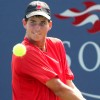By Andrew Eichenholz
Over the last 19 years, only two players who have won the USTA Boys 18s National Championships at Kalamazoo— the most prestigious tennis tournament for American juniors— have taken advantage of the wild card they receive into the U.S. Open, doing so by winning a match.
Former UCLA Bruin Dennis Novikov did far more in 2012.
“I remember hitting with him before he won Kalamazoo and thinking he was going to do well,” Nicholas Meister, Novikov’s former teammate at UCLA who has reached as high as No. 302 in the world, said. “It was cool to see, definitely.”
Novikov was living out any 18-year old American tennis player’s dream when he stood on Court 11 at the U.S. Open in the fourth set of a nearly three-hour-long battle against 31st seed Julien Benneteau. He would lose 3-6, 6-4, 7-6(1), 7-5, but would not go down without a fight.
“He pretty much hits every ball as hard as he could,” Meister said. “Most matches that he plays will be determined by whether or not his swings are landing in.”
It showed against Benneteau, as Novikov earned 22 break points with his aggressive play in the loss. More than anything, it looked like he belonged.
No winner of Kalamazoo had performed as well with their wild card since Michael Chang took his second round opponent to five sets in 1987. Chang peaked at No. 2 in the world rankings and won a Grand Slam during his career, putting Novikov in special company.
“I don’t think all the hype is always a good thing when it comes to that because I feel like the hype has definitely stalled some people’s careers in the past,” Novikov said. “Just because there’s hype doesn’t mean that’s where it’s at.”
Novikov was in as good a spot as he could be to launch his professional career after his results at the U.S. Open, also reaching the second round in doubles with partner Michael Redlicki.
He turned down another road, and enrolled full-time at UCLA.
“I felt like college just was a good place to mature physically and mentally as well,” Novikov said. “I still needed a little bit of experience of just maturing overall to play with all these guys on tour.”
Playing in front of sparse crowds against college players may not pose as consistent of a challenge as a seed at a Grand Slam day-in and day-out. But, that is not to say that Novikov regretted his decision.
“I’ve seen a lot of guys who have went pro and either gotten injured right away or gotten injured after a year or two, or just never really made it,” he said. “I feel like now I have other options other than just tennis if anything does ever happen.”
In fact, Novikov did not necessarily dominate at the college level, as he lost in UCLA’s 4-3 defeat at the hands of Virginia in the finals of the 2013 NCAA Tournament. He dropped the No. 1 singles point to Jarmere Jenkins, who has broken into the top-200 in the world himself, in straight sets.
That summer, Novikov turned pro. Now losing means more than what it says on paper, as he scrounges for all the money and ranking points he can get in the “minor leagues” of tennis, playing on the Futures and Challenger circuits.
“When I won my first round at the [U.S.] Open, I got 45 points for the first round beating [Jerzy] Janowicz,” Novikov said. “I played him first round at the [U.S.] Open for 45 points and an extra $15,000, but I can easily have played the same guy at a Challenger, but we’re playing for 7 points and $300.”
Life is not as glamorous as one may expect for someone who just a few years ago had hundreds watching his match as day turned to night at the U.S. Open.
“They don’t understand the struggle,” Novikov said about those who may criticize his or other players’ efforts. “We go from tournament to tournament battling the whole year just trying to make it just out of the Futures and Challengers.”
Nevertheless, in the time between the 2013 and 2014 U.S. Opens, Novikov slowly moved his way up the professional ladder, from No. 686 to No. 452 in the world. According to his former coach at UCLA, he has the weapons necessary to keep pushing forward.
“I think physically he’s very mature,” UCLA head coach Billy Martin said. “He has a very big serve, very big forehand.”
Now, he is in the world’s top-200, good enough to earn a spot in the qualifying tournaments of Grand Slams, including Roland Garros and Wimbledon, which he recently played.
“Obviously my goal is to qualify to all the tournaments and go as far as I can,” Novikov said, as he looks to make the main draw at the majors, which would guarantee him around $30,000. “That would be a big help in that aspect and also the points increase a lot more.”
At the end of the day, it is not just about the money for Novikov. Even though he may have taken the longer route to his ultimate goal, this year’s to crack the top-100, going to college has helped him improve in the long run.
“I definitely didn’t think it would take me this long to get to this ranking,” Novikov said. “I thought I would get to it quicker, but I’ve learned that it’s kind of a process and very few guys jump up very quickly.”
With that in mind, he now has a chance to take yet another step to achieving his goals, as he looks to qualify for his first Grand Slam main draw without a wild card.
“I’m only 21,” Novikov said. “I’m still very young and I still feel like I am going to make it.”

